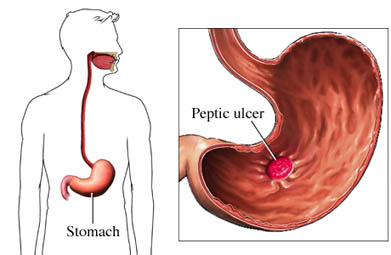When dealing with the discomfort of a stomach ulcer, many wonder: how long does it take a stomach ulcer to heal? Stomach ulcers, also known as gastric ulcers, are sores that form on the stomach’s lining. The healing process varies based on factors like the ulcer’s severity, treatment effectiveness, lifestyle changes, and adherence to prescribed medication. Understanding these factors is essential for managing recovery time and ensuring a smooth healing process. You can visit our hospital for a consultation on stomach ulcer to heal
What Is a Stomach Ulcer?
A stomach ulcer is a sore that develops when the protective mucus layer in the stomach is compromised. This exposes the stomach lining to harsh stomach acids, resulting in painful sores. Ulcers are primarily caused by an infection with Helicobacter pylori (H. pylori) bacteria or prolonged use of nonsteroidal anti-inflammatory drugs (NSAIDs). These ulcers may cause symptoms like burning pain in the stomach, nausea, bloating, and in severe cases, vomiting or bleeding.

How Long Does It Take a Stomach Ulcer to Heal?
The answer to how long it takes a stomach ulcer to heal depends on the ulcer’s severity and the treatment approach. On average, a mild to moderate stomach ulcer may take about 4-8 weeks to heal with appropriate treatment. However, larger or more severe ulcers can require up to 12 weeks or longer for full recovery.
Factors Affecting Ulcer Healing Time
- Severity of the Ulcer
Minor ulcers can heal more quickly, whereas severe or deep ulcers take longer. Larger ulcers may require more intensive treatment and follow-up. - Type of Treatment
Treatment typically involves a combination of antibiotics, proton pump inhibitors (PPIs), and sometimes medications to protect the stomach lining. Following the treatment regimen closely is crucial to effective and timely healing. - Lifestyle Modifications
Smoking, alcohol consumption, and spicy or acidic foods can delay healing. Those who follow a stomach-ulcer-friendly diet—focusing on non-acidic, bland foods and avoiding irritants—often see quicker results. - Medication Adherence
Consistency is key. Regularly taking prescribed antibiotics, PPIs, and antacids as instructed by a healthcare provider can significantly shorten healing time. Stopping or missing medications can lead to complications, prolonging recovery. You can visit our website on Good Gastroenterologist in Hyderabad: Dr. Vijaykumar C. Bada
Treatment Approaches and Expected Healing Times
1. Antibiotic Therapy
For ulcers caused by H. pylori, doctors prescribe antibiotics to eliminate the bacteria. These antibiotics typically take about two weeks to eradicate the infection, after which the ulcer may take additional weeks to heal.
2. Proton Pump Inhibitors (PPIs)
PPIs are drugs that reduce stomach acid, allowing the ulcerated tissue to heal. They are usually prescribed for 4-8 weeks, with milder cases improving within the initial treatment window.
3. H2-Receptor Antagonists
These medications also reduce stomach acid, although they’re generally less potent than PPIs. H2-receptor antagonists may be used in mild ulcer cases, helping to heal the ulcer within a similar 4-8 week timeframe.
4. Antacids and Stomach Protectants
In some cases, doctors may recommend antacids or medications like sucralfate that protect the stomach lining. These are often taken alongside PPIs or antibiotics to aid in pain relief and healing.
Dietary and Lifestyle Changes to Support Healing
Implementing dietary changes can be beneficial in managing the healing timeline for a stomach ulcer. Foods like fresh fruits and vegetables, lean proteins, and non-citrus fruits support healing by not irritating the stomach lining. Avoiding spicy, fatty, or acidic foods, as well as reducing caffeine and alcohol intake, can reduce symptom intensity and contribute to faster recovery.
For those wondering how long it takes a stomach ulcer to heal, lifestyle habits play a critical role. Smoking, for instance, impairs blood flow to the stomach lining, prolonging the healing process. Adopting stress management techniques, such as meditation or deep breathing exercises, is also beneficial since stress can exacerbate ulcer symptoms.
Monitoring Healing Progress and When to Seek Medical Advice
It’s essential to track progress and symptoms throughout the healing process. If symptoms persist beyond 8 weeks or worsen, consult a healthcare provider. Ulcers can sometimes lead to complications like bleeding or perforation, which require immediate medical attention. Routine follow-ups, particularly in severe cases, allow doctors to monitor healing, adjust medications, or suggest further interventions if needed.
Preventing Future Stomach Ulcers
Once a stomach ulcer heals, taking preventive measures is crucial for long-term stomach health:
- Limit NSAIDs: Minimize or avoid the use of NSAIDs; instead, opt for alternative pain relief options if possible.
- Maintain a Balanced Diet: Eating a balanced diet with low acid levels can support the stomach lining’s health.
- Address H. pylori Infections: Regular screenings and treatments for H. pylori help prevent recurring ulcers.
- Manage Stress: Engage in stress-relieving activities to reduce ulcer recurrence risk.
Conclusion
In answer to how long does it take a stomach ulcer to heal, the healing time largely depends on individual factors such as the ulcer’s size, treatment adherence, and lifestyle changes. With proper medication and care, most stomach ulcers can heal within 4-8 weeks, but severe cases may take longer. Following a healthy diet, managing stress, and avoiding stomach irritants are essential for preventing future ulcers and promoting lasting stomach health.
If you suspect a stomach ulcer, consult a healthcare provider to start treatment and avoid complications.